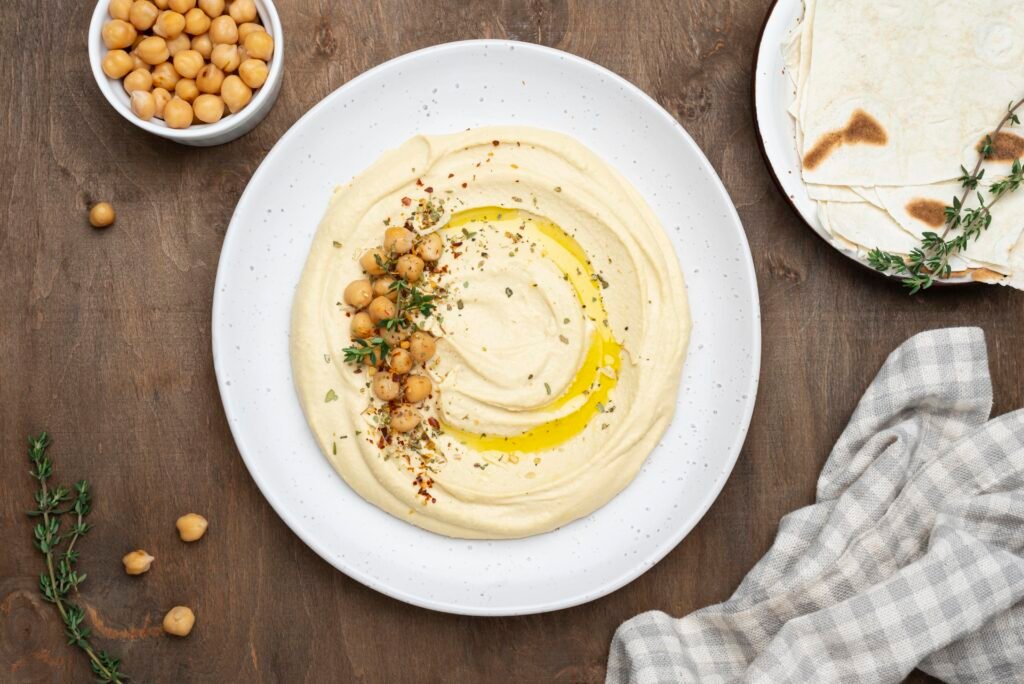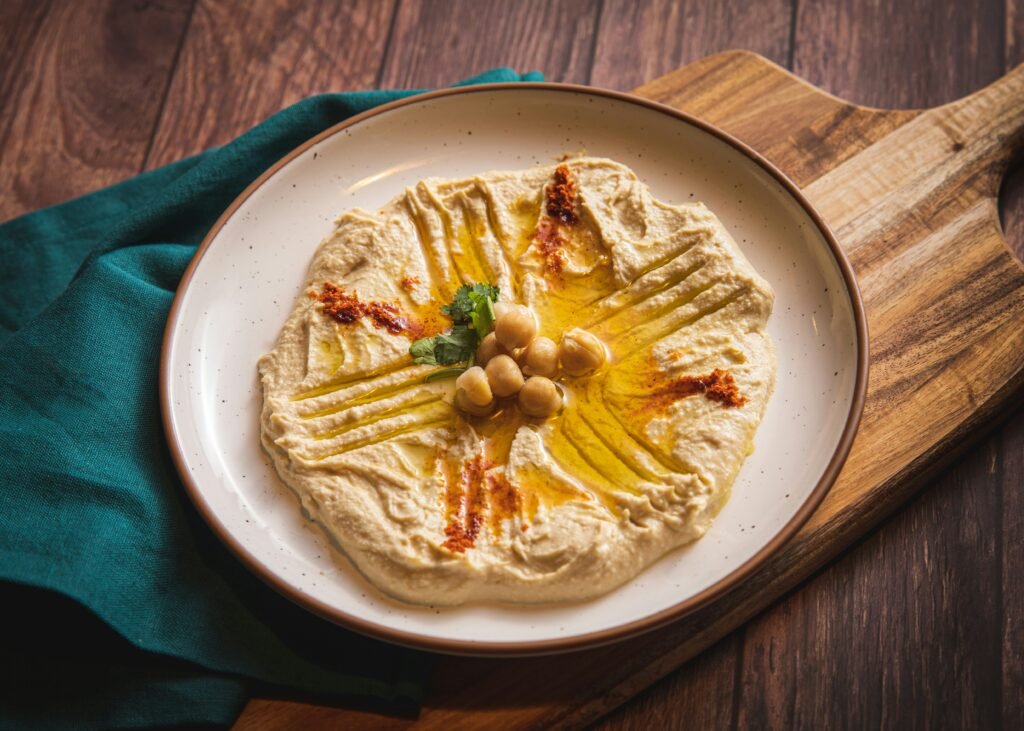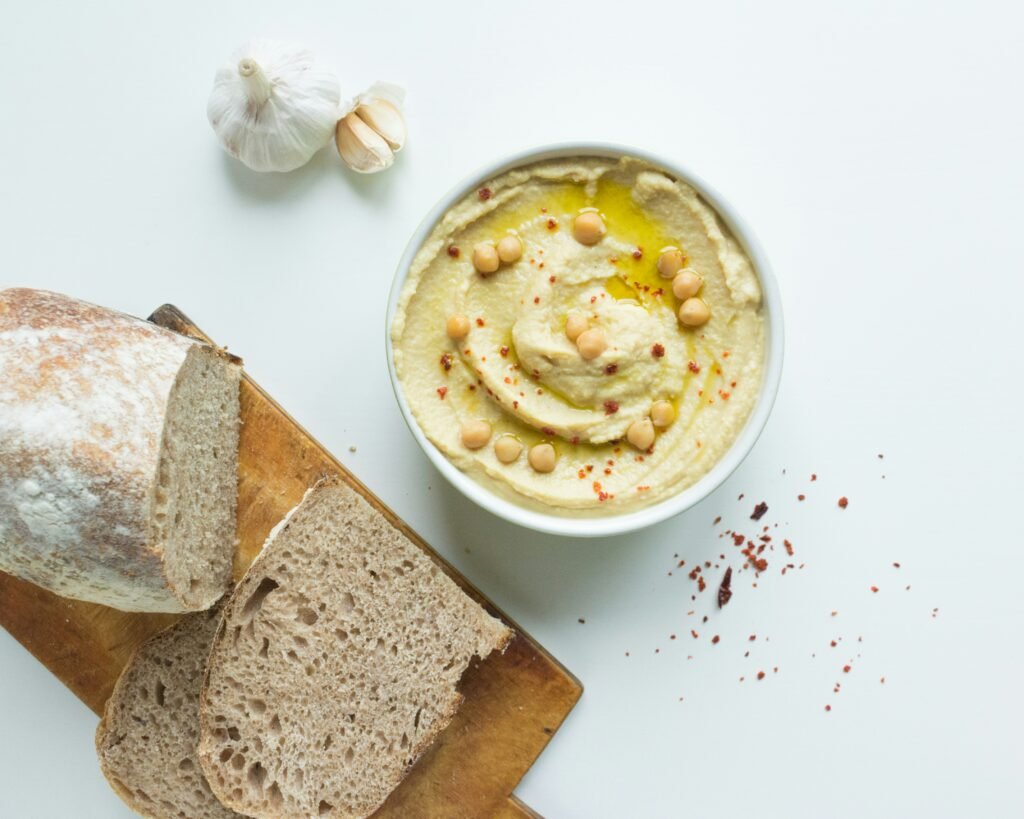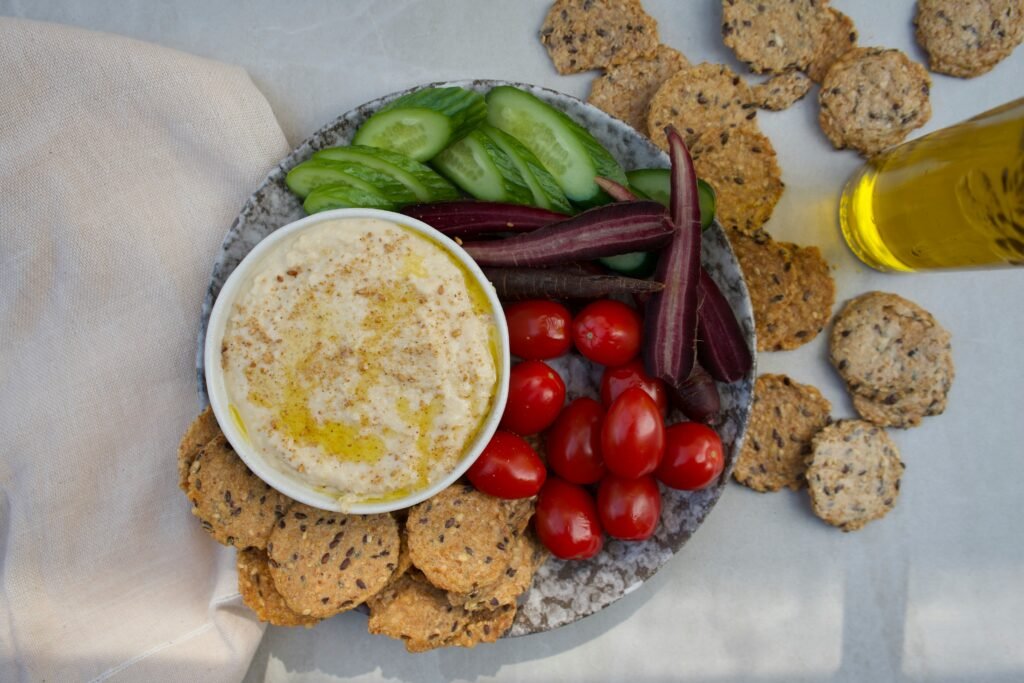Hummus is a tasty dip made from chickpeas, tahini, olive oil, lemon juice, and garlic. It’s a favorite for many and can be found in restaurants, grocery stores, and even gas stations as a quick snack.
In this article, we’ll look at the health benefits of eating hummus often and how to add it to your meals. With its great nutrition and versatility, see why hummus should be a regular part of your diet.

The Health Benefits of Hummus
Supports Healthy Weight Management
Hummus isn’t a magic solution for weight loss, but it can help you manage your weight in a healthy way. Hummus has plant-based protein and fiber that keep you full longer. If you stick to a 2-tablespoon serving, it’s also low in calories compared to other dips.
Sarah Keathley, a registered dietitian at Top Nutrition Coaching, cites a National Health and Nutrition Examination Survey (NHANES) to support this. She notes that people who eat chickpeas and hummus, along with other healthy habits, are 53% less likely to be obese and 51% less likely to have high glucose levels.
Aids in Digestion
You probably know that fiber is really good for your stomach and digestion. But a lot of people in the US still aren’t getting enough of it, like 9 out of 10 or even 97 out of 100! Hummus is a yummy way to get more fiber, especially when you eat it with colorful veggies.
Scientists have found out that the fiber in hummus is great for feeding the helpful bacteria in our stomachs and making our stomach bugs more diverse. Most food labels say you should have about 2 tablespoons of hummus at a time.
But some people might eat more, like around 4 tablespoons throughout the day. “Having 4 tablespoons of hummus gives you almost 6 grams of fiber. That’s good for you and can help make sure you’re getting enough fiber every day,” says Keathley.

Could Boost Heart Health
The stuff in hummus, like chickpeas and tahini, can help your heart stay healthy.
Chickpeas have good fats called polyunsaturated fats, which are good for your heart. They also have very few bad fats called saturated fats. Eating chickpeas helps your body get rid of cholesterol. Scientists found that eating chickpeas regularly can lower the levels of bad cholesterol and total cholesterol in your blood.
Tahini is made from sesame seeds and is also full of good fats like polyunsaturated and monounsaturated fats. It has antioxidants called sesamin and sesamol that can fight inflammation.
Studies show that these things in tahini can lower bad cholesterol and total cholesterol levels too. Sesamin can even stop your body from making and absorbing too much cholesterol, while sesamol helps take cholesterol out of your cells.
It’s super important to keep your cholesterol levels healthy to keep your heart strong and lower your chances of getting sick.
Promotes Stable Blood Sugar Levels
Hummus has both protein and fiber, which can keep your blood sugar levels steady.
Studies show that chickpeas, a main ingredient in hummus, have a lot of protein and something called resistant starch. This mix helps your body release certain hormones in the gut, like GLP-1, GIP, and PYY. These hormones help your body produce insulin after you eat, which helps control your blood sugar levels.
Hummus Nutritional Benefits
A 2-tablespoon portion of plain hummus includes the following:

- Calories: 80
- Carbohydrates: 5 g
- Dietary fiber: 2 g
- Total sugar: 0 g
- Added sugar: 0 g
- Protein: 3 g
- Total fat: 6 g
- Saturated fat: 1 g
- Cholesterol: 0 mg
- Sodium: 150 mg
- Phosphorus: 166 mg (24% Daily Value)
- Magnesium: 71.1 mg (17% Daily Value)
- Iron: 2.4 mg (13% Daily Value)
Even though hummus is just a small serving, it’s full of fiber and protein, which makes it a satisfying snack. It also has a lot of phosphorus, which helps keep your bones strong. Plus, it’s got magnesium and iron, which are really important for your muscles and cells to work right.
Is Hummus Okay for Everyone to Eat?
Hummus is usually good and safe for most people to eat. But there are a few things to think about:
Allergies: If you have food allergies, it’s important to read the ingredients in hummus carefully. Hummus has sesame in it, which comes from tahini, and sesame is a common allergen. If you’re allergic to sesame, you might want to make your own chickpea spread at home without using tahini.

Sodium Content: Hummus you buy from the store might have a lot of salt, especially if you eat a lot of it. If you need to watch your salt intake, you should either eat it in small amounts or make your own at home, where you can control how much salt you put in.
Pregnancy: Keathley talks about the discussion on whether pregnant people should eat hummus. Some worry because tahini, made from sesame seeds, could have salmonella. Keathley says if you eat hummus with sesame seeds that have been heated and follow the expiration date, it’s usually okay.
Also, it’s best not to share your hummus directly from the container to avoid passing bacteria.
How to Enjoy Hummus?
Hummus is really flexible and can be used in snacks, meals, and even desserts! Here are some suggestions:
Pair with Vegetables: Try using hummus as a dip for raw veggies like carrots, celery, and bell peppers to make them tastier.
Spread on Sandwiches: Swap out mayonnaise for hummus in your sandwiches or wraps. It gives you that creamy taste but with extra fiber and protein. Looking for ideas? Try some Veggie Wraps with Cilantro Hummus.
Use as a Salad Dressing: You can make a simple and tasty salad dressing by mixing hummus with a little water, lemon juice, or olive oil.
Incorporate into Meals: Put a spoonful of hummus on bowls, wraps, or baked potatoes to give them more taste and nutrients. You can also spread it on Hummus Crusted Chicken for a delicious twist.
Make a Dessert Hummus: Make something sweet using chickpeas and tahini with Dark Chocolate Hummus. It’s great for dipping strawberries or graham crackers!
Try Different Flavors: Try adding different things to hummus to make it tastier, like roasted red pepper or avocado. You can also buy hummus with lots of different flavors from the store.
